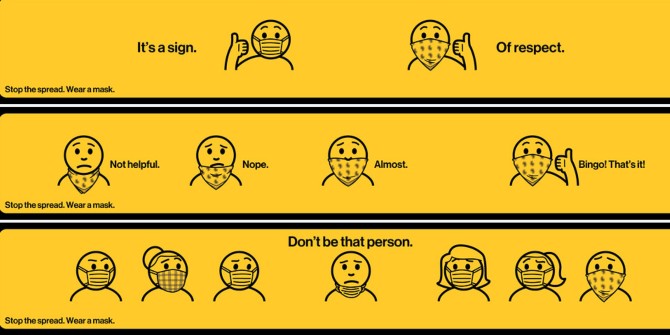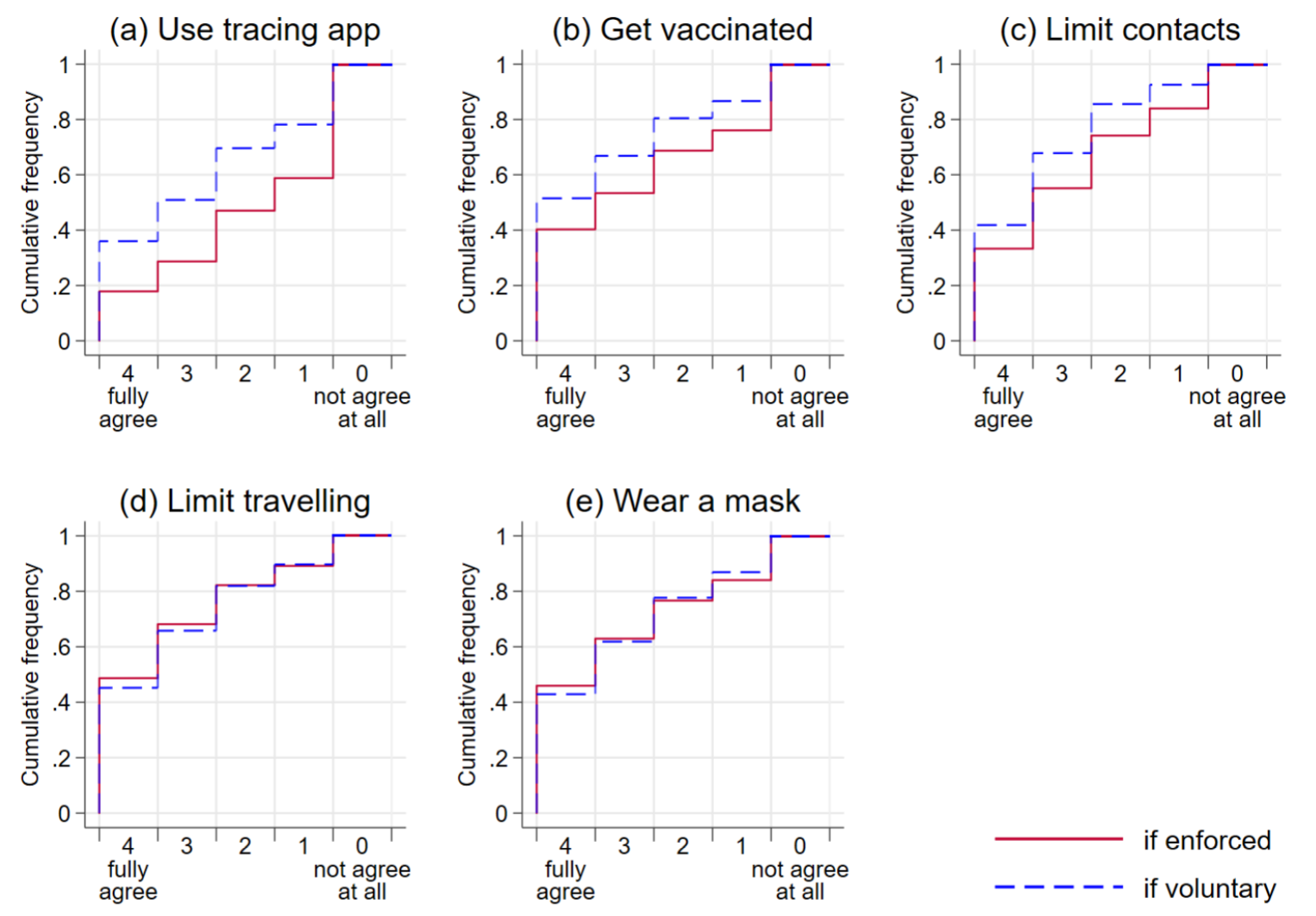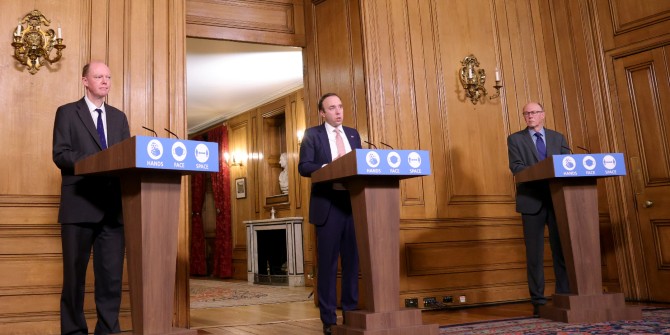How does enforcement affect support for COVID-19 virus containment policies? Katrin Schmelz (Universität Konstanz and Thurgau Institute of Economics) explores evidence from Germany. Enforcement may be effective for measures provoking few adverse reactions and where compliance is readily ensured, such as mask-wearing and travel restrictions. But for contact tracing apps and vaccination, which are difficult to enforce and evoke substantial control aversion, enforcement might be unwise. Control aversion increases with distrust of the government, and is less prevalent among those who had lived under the communist regime of East Germany.
What is the appropriate role of enforcement and explicit incentives, as opposed to people’s sense of responsibility and voluntary compliance, in combating the COVID-19 pandemic? Strictly-enforced mobility restrictions have been shown to be highly effective in controlling the spread of the virus. But we also see substantial voluntary cooperation, even without enforcement or material incentives. Less stringent lockdowns in democracies have been found to be at least as effective in reducing movement as more stringent lockdowns in autocracies.
Most anti-COVID-19 policies share the fundamental structure of public goods dilemmas: all-encompassing cooperation maximises the well-being of all citizens, but cooperation is costly, and citizens cannot be excluded from the benefits of the public good even if they do not contribute. This means each individual has an incentive to free-ride on others’ cooperation. According to a large literature on cooperation and punishment, many people willingly contribute to a public good – conditional on others doing the same – and they also expect enforcement to ensure higher co-operation in the population. This mechanism predicts that agreement to follow COVID-19 containment measures might be higher if a measure is enforced than if it remains voluntary.
On the other hand, enforcement and incentives can reduce intrinsic motivation, a phenomenon called “motivational crowding-out”. The possibility that the effectiveness of an enforcement-based approach might be compromised because it crowded out voluntary commitment has also been termed “control aversion”.

In a new paper, I explore these two countervailing effects of enforcement on motivation with respect to measures combating COVID-19 in five areas: contact tracing apps, vaccination, contact restrictions, limitations on travel, and wearing masks. In a Germany-wide online survey with nearly 5,000 respondents, I investigate the extent to which people agree to follow those measures under two conditions: if the regulation is strongly advised by the government but remains voluntary; and if it is enforced. The survey was conducted at the end of the first lockdown in Germany.
Average agreement is never higher under enforcement
As shown in the cumulative distributions of Figure 1, the level of voluntary support is substantial across all policies. I never observe significantly higher agreement under control. Voluntary agreement is always either higher than agreement under enforced measures (contact tracing apps, limiting contacts, vaccination; panels (a-c) or virtually identical (limiting travel and wearing masks; panels d, e).
Across all these areas, roughly 50-70% of respondents agree to stick to voluntary anti-COVID-19 regulations (blue lines, levels 3 and 4). The drop in agreement under control is most striking for the contract tracing app, where less than 20% totally agree under enforcement, while enforcement provokes the strongest opposition (level 0) among more than 40% of the sample. The share of respondents who fully agree to use the app if implemented voluntarily is in line with the share of actual downloads (relative to possible downloads) within the first six weeks of the launch of the app in Germany.
Figure 1: Cumulative distributions of agreement under the enforced vs. voluntary implementation of a policy.
For example, (a) shows that 18% and 36%, respectively, of respondents totally agree to use a contact tracing app if it is enforced and voluntary, respectively. The sum of those expressing either agreement level 3 or 4 amounts to 29% and 51%, respectively, in case of enforcement and volition, respectively. Strongest opposition (level 0) was expressed by 41% and 22%, respectively, under enforced and voluntary implementation, respectively (the final step in the upper left graph).

Control aversion, especially for contact tracing apps and vaccination
Control aversion, meaning lower agreement under enforced than under voluntary conditions, happens across all policies, with the frequency varying between 25% (travelling) and 40% (app). Depending on the domain, few — between 12% (app) and 28% (masks) — respond positively to control, i.e., their agreement is greater under compulsory measures. Roughly half of the sample is neutral with respect to (non-) enforcement, expressing the same level of agreement to a measure irrespective of whether it is implemented voluntarily or compulsorily. Negative responses (control aversion) are more frequent than positive responses to control for the app, vaccination and contact limitations, while positive and negative responses to control cancel out each other for travel restrictions and masks.
Trust in government and communist experience reduce control aversion
What explains control aversion? As shown in Figure 2, the less respondents trust the German government in general (panel a) and specifically in the government’s truthful information about the coronavirus outbreak (b), the more control-averse they are in all five areas. Overall agreement to follow a measure (no matter if voluntary or enforced) is higher when the government is perceived as trustworthy.
The more respondents were exposed to the communist regime of East Germany (as captured by the linear combination of the coefficients for having spent their childhood in a federal state belonging to East Germany, and its interaction with age), the less control averse they are (c). Older East Germans are clearly less control-averse than older West Germans in all domains except for masks. This is consistent with the effect of mere exposure: those brought up in East Germany prior to 1990 were subject to ubiquitous surveillance, compulsory vaccination, and restrictions on movements (where stay-at-home orders, coming along with contact restrictions, could be interpreted as an extreme form of travel restrictions), while wearing masks is rather exotic and not part of the experience of East (and West) Germans prior to the pandemic.
Figure 2: Predictors of control aversion (as measured by the difference between voluntary agreement and agreement under control) in the five areas
The coefficients and 95% CI on control aversion are shown, estimated in OLS linear regressions with standardised variables. For example, panel (a) shows that a standard deviation difference in the extent to which people distrust the German government is associated with increased control aversion of somewhere between ten and 15 percent of a standard deviation for contacts, travel and masks.

How to limit crowding-out of voluntary support for anti-COVID-19 policies
My results show that crowding-out may be an important determinant of effectiveness. Policy-makers should try to mitigate it, in particular for policies that are intrinsically difficult to enforce.
The results in Figure 2 suggest that the effectiveness of voluntary compared with enforced measures to address the pandemic will differ across populations. Crowding-out of intrinsic support due to enforcement may be more of a concern in liberal democracies than in populations with recent experience of coercive regimes. The more confidence people have in their government in general and in its truthfulness about the outbreak, the more they agree to follow both voluntary and enforced policies, and the less detrimental is the effect of enforcement on voluntary support for a measure. This suggests that enforcement might create less resistance in countries where trust in government is high than in those where it is low.
Policy implications
Masks
These findings need to be assessed in conjunction with other aspects, including the level of compliance required for a policy to be successful, and the extent to which a policy is enforceable. In the case of wearing masks, which mainly confers significant benefits for others, an enforced mandate is promising. Since mask compliance is easily observable and conditional cooperators probably constitute a large share of the population, compliance may not be sustainable if a substantial minority does not comply. My survey suggests that non-compliance with a voluntary mask-wearing policy would be substantial (Figure 1e). This, along with the feasibility of enforcement and only moderate control aversion, indicates that enforcement would be a valuable approach. Similar considerations apply to policies limiting travel, where the motivational costs of enforcement are low (Figure 1d) and enforcement can be quite effective.
Contact tracing apps
The picture looks quite different for a contact tracing app, the success of which is thought to need compliance by a large majority. According to my survey results, this would be unlikely under a voluntary policy (Figure 1a). However, enforcement of a contact tracing app would encounter significant resistance. Such heavy opposition evoked by a policy that is difficult to impose speaks against its enforced implementation.
Vaccination
With respect to vaccination, my data support voluntary regimes. According to epidemiological estimations, about-two thirds of the population need to be immune in order to reach herd immunity. This threshold may be lowered when vaccinations are not allocated randomly but primarily to those who are more likely to get infected. In my survey, between half and two-thirds of Germans say they would agree to get vaccinated voluntarily (Figure 1b), whereas enforcement would evoke considerable opposition.
Limiting contacts
While we wait for vaccines to be distributed, limiting contacts is at the core of fighting the pandemic and requires extensive cooperation. Even though voluntary support is higher than support in case of enforcement, strong opposition to enforced contact restrictions is less frequent than for those other policies (Figure 1c). Voluntary cooperation of about two-thirds is unlikely to be enough, in particular as a limited number of super-spreading events have been shown to drive the pandemic. Therefore, some degree of enforcement may help to increase cooperation among healthy people who have lower incentives to avoid getting infected themselves but whose cooperation would protect those more at risk of serious disease.
Interventions to combat COVID-19, future pandemics – and potentially also other societal challenges such as the climate emergency – vary in the extent to which enforcement may meet opposition that an appeal to voluntary participation would avoid. This may be particularly true for more invasive interventions such as contact tracing apps and vaccinations, among people who distrust their government, and in societies with a long history of liberal democracy.
This post represents the views of the author and not those of the COVID-19 blog, nor LSE. It draws on Schmelz, Katrin (2021): Enforcement may crowd out voluntary support for COVID-19 policies, especially where trust in government is weak and in a liberal society. Proceedings of the National Academy of Sciences of the United States of America (PNAS).





